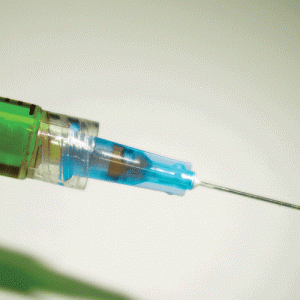Dr Laura Waters is an HIV and sexual health consultant at the Mortimer Market clinic and the Boyz Doc. Here she outlines how some STIs can be prevented by vaccination.

Knowing how to reduce your risk of acquiring sexually transmitted infections (STIs) is an important part of enjoying a healthy sex life. Some STIs can be prevented by vaccination; this column covers those three and how to get vaccinated if you’re at risk.
Hepatitis A is a topical one to start with – I wrote about this for Boyz in February and the current outbreak continues. Hep A infects the liver; it’s a ‘faeco-oral’ virus meaning it’s found in poo and enters the body through the mouth. You can catch it from contaminated food and drink or from any sexual activity that brings bums or poo near the mouth.
Symptoms vary: jaundice (going yellow) is common but flu-like symptoms or tiredness may be the first, and only, symptoms. There is no specific treatment and most people make a complete recovery without need for hospital admission. If you’re diagnosed with hep A it’s important to tell sexual partners and household contacts so they can get vaccinated, don’t prepare food or drink for others and avoid drugs and alcohol; try to avoid sexual activity but if you do have sex use condoms/dams/gloves and wash hands/sex toys! If you’re worried you have hep A go to your GP or sexual health clinic for a test – if you are unwell you can go to an emergency department.
Sexual health clinics vaccinate gay men during outbreaks and most had not been offering routine vaccination in recent years until the recent surge in cases – you can go to any sexual health clinic to get advice and vaccination, particularly if you’ve had contact with someone with the infection. You may have been vaccinated already at a sexual health service, or as part of travel vaccinations. The vaccine is given as two doses, 6-12 months apart, and you don’t need a booster until 25 years later if you’re still at risk. If you have had hep A infection you are immune for life. For more information check out Terrence Higgins Trust’s website: http://www.tht.org.uk/sexual-health/About-STIs/Hepatitis/Hepatitis-A.
From A to B – hepatitis B is another virus that infects the liver and is mainly found in blood and sexual fluids. In places where it’s uncommon, such as North and Western Europe, sex and injecting drugs are the main ways to pass it on. If you do get hep B as an adult you may have no symptoms or a flu-like illness or jaundice; there’s a high chance your body will then clear the infection and you’ll be immune for life. Around 1 in 20 adults do not clear the virus and develop chronic infection – this can cause liver inflammation and scarring leading to complications like cirrhosis (severe scarring) and liver cancer. Anyone with chronic hep B should have regular check-ups and can be offered treatment if indicated.
Unlike many countries the UK does not offer routine vaccination at birth so people at risk should get vaccinated if they are not immune. All people with HIV should be vaccinated; other people who sexual health clinics will test and vaccinate include gay men (regardless of HIV status), injecting drugs user, people from countries where hepatitis B is common and sexual partners of people who have, or are at high-risk of, the infection. A vaccine course is four doses over a 6-12 month period with a booster five years later – if you are HIV-positive your clinic will check your immunity levels regularly and offer a booster if they drop.
Finally human papilloma virus or HPV; there are more than 100 types of HPV. Most do not cause symptoms, some cause genital warts and persistent infection with high-risk HPV types can lead to cancers affecting the genitals, anus and throat, as well as cervical cancer in women. The majority of sexually active people get HPV at some point – usually the body clears the virus after a year or so and many people will never realise they’ve had it. For example, most people infected with genital wart strains don’t develop visible warts.
Vaccines have been developed that protect against the HPV types responsible for most genital warts (6 & 11) and the two main high-risk types that can cause cancer (16 & 18). There has been a national HPV vaccination programme in schools since 2008 but only for girls – there has been a lot of debate about including boys and, based on new evidence about vaccine effectiveness and the limitations of vaccinating girls only, plans to extend vaccination to boys are under consideration. However, new evidence combined with the fact that gay men are at much higher risk of HPV disease, especially anal cancer caused by the HPV 16 strain, led the committee that advises the government on vaccines to recommend vaccinating men who have sex with men up to the age of 45. Based on this a pilot programme started last year at selected sexual health clinics in England to provide vaccination with three doses of Gardasil – a vaccine brand that covers types 6, 11, 18 & 18 – this is likely to continue into 2018 and you can find a list of participating clinics on the gov.uk website.
HPV vaccine is very safe and there is good evidence to show it reduces HPV-related disease. It can be bought privately and Boots have just extended their HPV vaccination service to include people up to the age of 44, including men; if you are over 15 you need three doses (£450 at Boots). Superdrug offer the vaccine as long as you are no older than 26 and you can find a large number of private clinics online that offer HPV vaccine.
So, there are highly effective vaccines available for three important infections that can be passed on through sexual contact: free hepatitis A and B vaccines are available routinely, HPV only at clinics participating in the national pilot scheme unless you pay for a course privately. Hopefully free HPV vaccination will be extended to boys in school and all men who have sex with men at any sexual health clinic or general practice soon. It’s important to note that being immune to one type of hepatitis does not protect you against any others, that there is no vaccine or immunity against hepatitis C (if you’ve had it once you can get it again).













